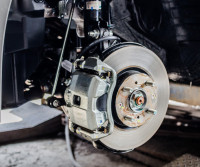
So much of car discussion is focused around going. How fast is it What kind of gas mileage? What’s the fuel tank range? But just as getting there is important, so is arriving, and that requires good brakes!
Brakes are an often overlooked maintenance item. They’re put off and ignored until they become dangerous. Do yourself a favor: learn about your brakes and learn how to take care of them!
There are two primary types of brakes, each with differing maintenance needs.
Disc Brakes
Disc brakes are by far the most popular type of brake. Their mechanism of action is simple: friction. A pair of metal parts called calipers hold pads composed of various metal or ceramic materials. These calipers are connected by tubes to a reservoir of fluid under your hood. When you press the brake pedal, the fluid is pressurized, clamping the pads down on a shiny, silver disc called a rotor. Since the rotors are attached your axle, this stops your car.
The most obvious wear item for disc brakes is the pads. These wear out at different intervals depending on what they’re made of; ceramic brake pads are expensive, but usually last longer. You may also need to have your rotors turned, basically resurfaced on a machine to renew their stopping power.
It’s a common myth that brake pads only need to be replaced when they start squeaking. In reality, squealing may already mean that your brakes are damaged! Worn pads can damage the calipers themselves, which are far more expensive to replace. Have your brakes inspected during any routine service to save you money in the long run.
Drum Brakes
Drum brakes are a cheaper, older style of brake that have less stopping power than discs. On lower-end models, you will sometimes see them used on the rear wheels. Since the front brakes do most of the work, rear drums are a safe way to save money in economy cars.
They work on the same principle of friction. The difference is that they lay inside a closed metal drum. When you press the pedal, metal strips called shoes press on the inside of that drum, causing friction and slowing down the car.
Even though your front brakes do most of the work, your rear brakes have one very important function: your emergency brake! Though they will last longer than your front brakes, it’s important to have your brake shoes regularly inspected.
Need new pads, shoes, or a brake fluid change around the North Carolina Triangle? Fast Lube Plus offers prompt brake service at fair prices. Come in today and let’s get you taken care of!
